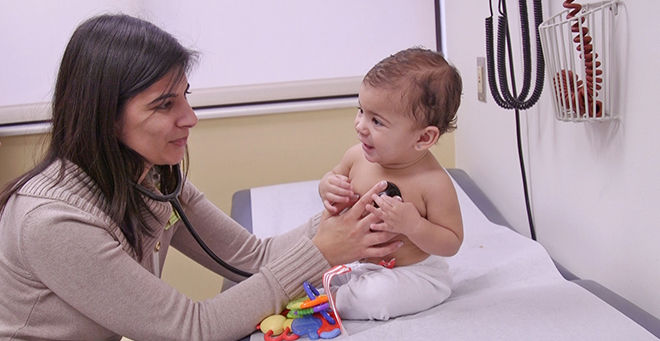
A new study by UMass Chan Medical School examining strategies to help ensure children receive their daily asthma medicine is expected to start early next year at pediatric clinics across the state.
Michelle K. Trivedi, MD’09, MPH, associate professor of pediatrics, pediatric pulmonologist and asthma clinical researcher, received a $3.8 million grant from the National Heart, Lung and Blood Institute to lead the randomized trial. This study builds on Dr. Trivedi’s previous research that demonstrated how a program she directs, Asthma Link, brought together school nurses, pediatricians and families to improve daily medication adherence.
“I see children suffering from repeated visits to the hospital and ER because they are not receiving their daily asthma medicine. I am excited to examine and disseminate practical strategies to improve this problem,” Trivedi said.
Trivedi and her team will test several approaches, including one in which families will receive written guidance to help their child use their daily asthma inhaler and another in which families will receive written support as well as supervised support at school from the child’s school nurse. This second strategy, Asthma Link, links pediatric practices with schools to allow for school-supervised asthma therapy under real-world conditions. The goal of this study is to determine how effective each approach is at improving asthma symptoms for children.
“We’ve seen that families and pediatric clinics need practical support to address the issue of poor medication adherence, especially as it is the leading cause of asthma symptoms for so many children."
The study will partner with 14 pediatric practices, schools and families in Massachusetts to serve children with difficult-to-control asthma symptoms in grades K through 8. The trial will enroll 350 parent–child dyads.
“With this grant, we’re able to address medication adherence on a much larger scale, to examine the best strategies to make sure children take their inhalers every day,” Trivedi said.
Asthma is the most common chronic disease of childhood, affecting more than 6 million children in the United States and resulting in more than 14 million missed school days each year. According to the Center for Disease Control and Prevention, in 2020, nearly 8 percent of school-aged children in Massachusetts had asthma. However, as few as 20 percent of children are taking their prescribed daily medication, resulting in asthma symptoms and asthma attacks that are preventable.
“We’ve seen that families and pediatric clinics need practical support to address the issue of poor medication adherence, especially as it is the leading cause of asthma symptoms for so many children,” Trivedi said.
From July 2021 to early 2023, Trivedi organized a pilot trial to examine the feasibility of conducting a trial of the Asthma Link program and other supports for pediatric practices with 66 school-aged children in Central Massachusetts.
For the upcoming study, Trivedi and her team will continue to focus on engaging and recruiting children and families often underrepresented in research.
“This is critical in our work. If we do not engage children and families in large clinical trials from low-income and minoritized backgrounds, as researchers and clinicians, we simply cannot know if our best and most innovative strategies work for them. Since these are the children suffering from the worst asthma symptoms, we want to ensure they are included,” Trivedi said.

